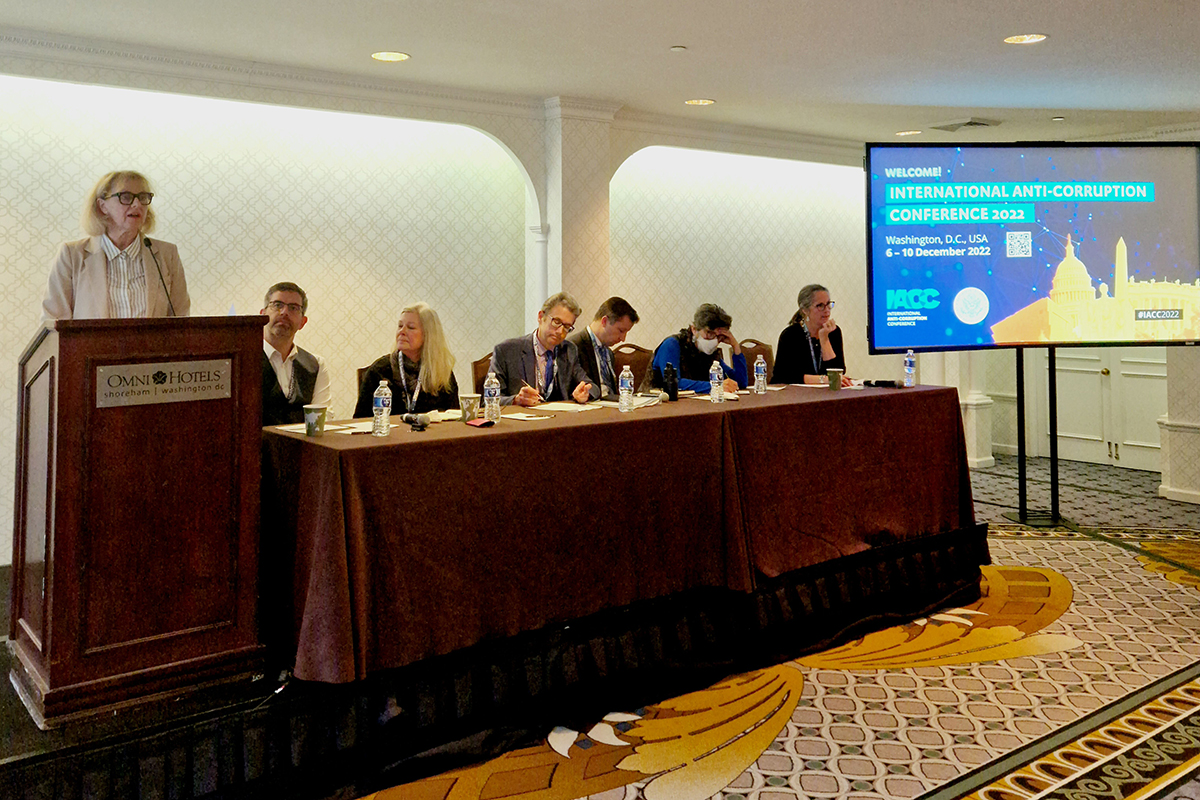Following the money to detect environmental crimes: opening remarks by Liechtenstein's Minister of Infrastructure and Justice

The following opening remarks were made by H.E. Graziella Marok-Wachter, Minister of Infrastructure and Justice of the Principality of Liechtenstein, at the 2022 International Anti-Corruption Conference in Washington, D.C. on 7 December 2022.
The session on Using Follow-the-Money Techniques to Detect Environmental Crimes: Potential and Challenges was coordinated by the Basel Institute on Governance in cooperation with the Principality of Liechtenstein.
Dear Panelists, dear Participants,
I would like to welcome you all to this panel discussion jointly hosted by the Basel Institute and Liechtenstein. We have a long and very successful partnership with the Basel Institute, a true champion in the fight against corruption. It is thus a pleasure for me to launch this panel discussion with outstanding speakers on an issue of great importance: how to follow the money to fight environmental crimes.
Environmental devastation as a result of criminal activity is already a defining challenge of our time. And it is growing to unparalleled levels: estimates from Interpol and the Global Initiative Against Transnational Organized Crime put the total illicit gains from environmental crime at a staggering 110 to 281 billion US Dollars per year.
What do such figures mean? Of course, they represent estimates, and no estimate is certain, but without any doubt the scale of the problem is catastrophic.
Such figures also mean that finances are crucial to addressing environmental crime.
While we tend to underestimate the impact of environmental degradation on our climate, on biodiversity or on our health, our legal systems commonly seek to put a price on the losses that such crimes cause and assign punishments on that basis.
With this in mind, it is clear that figuring out the finances of environmental crimes is key to developing an appropriate response. In other words, financial investigations need to be a central element of the law enforcement response to environmental crime.
Here are some brief examples to show how much international policy converges on this issue:
- In 2017, G20 Leaders recognized the link between wildlife crimes and corruption, and called for the tracking of such financial flows.
- Only a few weeks ago in Bali, G20 Leaders highlighted the importance of international standards to fight systemic corruption and environmental crimes, recognizing their grave impact on economies and societies.
- The UN General Assembly has urged States to treat illegal wildlife trade as a predicate offense for money laundering.
- The FATF has encouraged States to conduct parallel financial investigations into illegal wildlife trade and similarly into mining, forestry, and waste trafficking.
- The OECD, for its part, has recommended bringing in financial intelligence units in follow-the-money investigations related to wildlife crime.
These examples show the strong policy momentum we have on this question. Now we have to build actual capacity to follow the money as a pre-requisite to investigate and prosecute environmental corruption. We have to put an end to environmental criminal syndicates operating with impunity on a high-profit and low-risk business model.
Prosecutors have an important role in that regard. The necessary legal tools and investigative techniques should be put to the disposal of prosecutors in order to combat environmental crime. Parallel financial investigations focusing on both the environmental crimes and the connected money laundering offences are an effective tool to identify larger criminal networks and disrupt financial flows. Liechtenstein is actively engaged in discussions to strengthen the role of prosecutors to address environmental crime. The Council of Europe in an important forum in that respect.
The follow-the-money approach has been successful in fighting transnational organized crime in other areas. It is at the core of the “FAST initiative” to mobilize Finance Against Slavery and Trafficking (FAST).
We are convinced it will be successful here as well. That is why Liechtenstein has been a donor of the Basel Institute’s Green Corruption program for the third year running. Next year, we will see a focus on bringing together practitioners engaged in tackling environmental corruption through financial investigations in cooperation with USAID. This is a joint project between WWF, TRAFFIC, Transparency International, and the Basel Institute, launched yesterday here at the IACC. I invite everyone interested to join forces and participate.
We understand that follow-the-money approaches are complex and will not be established overnight. Robust discussion is required to ensure that the roll-out of such approaches is as effective as possible. The IACC is a perfect platform for that.
Accordingly, I am looking forward to experts’ discussion about the achievements and the remaining obstacles making financial investigations an effective tool that can be mainstreamed by environmental enforcement agencies around the world.
I thank you all for your attention.
Learn more
- Download the opening remarks as a PDF.
- See more about the #IACC2022 session on Using Follow-the-Money Techniques to Detect Environmental Crimes.
- View the session recording on YouTube.
- Read about the Green Corruption programme and the Principality of Liechtenstein's valuable support.
- Find out about the Countering Environmental Corruption Practitioners Forum, which was launched at the IACC. For those at the IACC in person, join a meet and greet session on Thursday 8 December, 12:30 in Embassy room. More details here.



